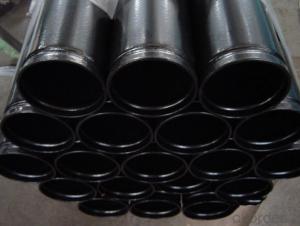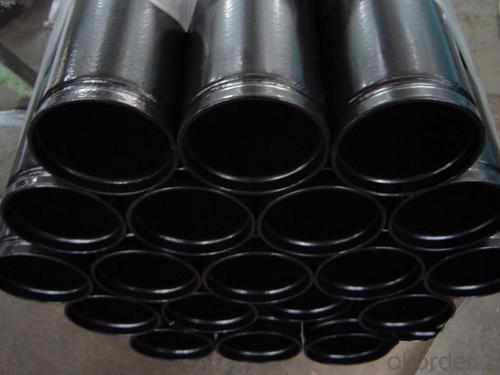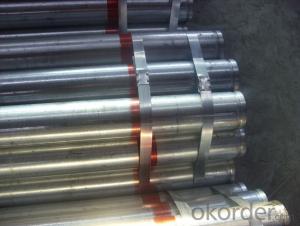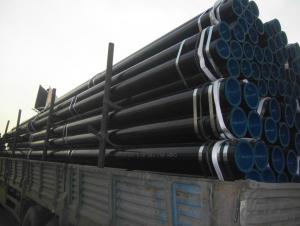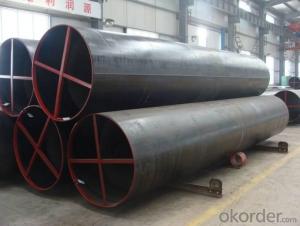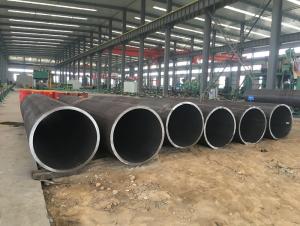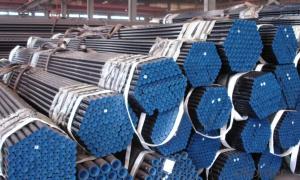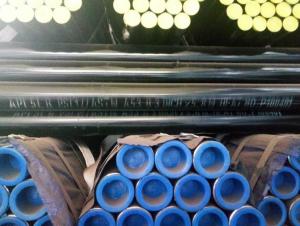black painted seamless grooved pipe for fire fighting
- Loading Port:
- China Main Port
- Payment Terms:
- TT OR LC
- Min Order Qty:
- -
- Supply Capability:
- -
OKorder Service Pledge
OKorder Financial Service
You Might Also Like
Our company is specialized in the supply of Hot Dipped Galvanized Pipes. We supply stee pipesl with very competitive price to meet customers' needs with the satisfied service and high standard quality.
Name | galvanized pipe with the standard quality |
Material | Q195, Q215, Q235, Q345, STK500 |
Specification | O.D.: 20- 273.1MM W.T.: 0.8 - 5mm |
Length | 5.8m, 6m, 11.8m or 12m, or per the buyers demand |
Surface treatment | Oil-dip, Varnish, Passivation, Phosphating, Shot Blasting. |
Certificates | BS1387-1985, DIN2440/2441, JIS-G3444 and ASTM |
Manufacture Technique | Seamless |
Section Shape | Round |
End | A): GTC (galvanized threaded and coupling) |
Weight | Billing on the basis of theoretical weight |
Packaging Details | Export packing or negotiation |
Trade Terms | FOB/CFR/CIF |
Payment Terms | L/C T/T |
Usage | Petroleum casing pipe/etroleum cracking pipe/gas cylinder tubes/highpressure boiler tubes/ high pressure chemical fertilizer pipe, ship tube |
Delivery Time | 7-30 days OR upon the negotation |
Minimum Order Quantity | 20/50/100 MT |
Supply Ability | 1000 Ton/Month |
Inspection | Chemical Composition Inspection, Mechanical Properties Test(Tensile Strength,Yield Strength, Elongation, Flaring, Flattening, Bending, Hardness, Impact Test), Surface and Dimension Test,No-destructive Test, Hydrostatic Test. |
- Q: Can steel pipes be used for telecommunications cables?
- No, steel pipes cannot be used for telecommunications cables. Telecommunications cables typically require materials with high electrical conductivity and insulation properties, such as copper or fiber optics. Steel pipes are not suitable for transmitting signals and would interfere with the transmission of data.
- Q: How are steel pipes insulated to prevent noise transmission?
- Steel pipes are typically insulated to prevent noise transmission through the use of materials such as mineral wool, fiberglass, or foam. These insulation materials are wrapped around the pipes to create a barrier that absorbs and reduces sound waves, preventing them from traveling and causing noise transmission.
- Q: How are steel pipes used in the manufacturing of scaffolding?
- Steel pipes are commonly used in the manufacturing of scaffolding as they provide a strong and durable framework. They are used to create the main structure of the scaffolding, providing support and stability for workers and materials. The pipes are typically joined together using fittings, allowing for easy assembly and disassembly of the scaffolding system. Additionally, steel pipes can be easily adjusted to different heights and configurations, making them a versatile choice for scaffolding construction.
- Q: How are steel pipes used in sewage treatment plants?
- Steel pipes are used in sewage treatment plants to transport wastewater from one area to another, such as from the collection point to treatment tanks or from treatment tanks to discharge points. They are also used for the installation of various equipment, such as pumps, valves, and screens, which are essential for the treatment process. Additionally, steel pipes are used in the construction of structural components like supports and platforms within the plant. Overall, steel pipes provide a durable and reliable solution for the efficient management and movement of wastewater in sewage treatment plants.
- Q: Are steel pipes suitable for use in automotive industries?
- Yes, steel pipes are suitable for use in automotive industries. Steel pipes offer high strength, durability, and resistance to corrosion, making them ideal for various applications in the automotive sector, such as exhaust systems, suspension systems, and fuel delivery systems. Steel pipes can withstand high temperatures and pressures, ensuring reliable performance and safety in automotive vehicles.
- Q: How are steel pipes insulated for thermal purposes?
- Steel pipes are commonly insulated for thermal purposes using a variety of methods. One of the most common methods is to wrap the pipes with insulation material such as fiberglass, mineral wool, or foam. This insulation material acts as a barrier between the pipe and the surrounding environment, preventing heat transfer or loss. To properly insulate steel pipes, the insulation material is typically wrapped tightly around the pipe, ensuring that there are no gaps or openings for heat to escape. The insulation is then secured in place using adhesive tapes or metal bands. In addition to external insulation, pipes can also be internally insulated. This involves placing insulation material inside the pipe, creating a layer of protection against heat loss or gain. Internal insulation is commonly used in applications where the pipe carries hot fluids or gases. Furthermore, some steel pipes are designed with a built-in insulation layer. These pipes, known as pre-insulated pipes, have insulation material already integrated into the pipe structure. The insulation layer is typically made of foam or mineral wool and is covered with a protective outer layer, providing effective thermal insulation. Insulating steel pipes for thermal purposes is crucial in various industries, such as oil and gas, HVAC, and plumbing. Proper insulation helps to maintain the desired temperature of the fluid or gas flowing through the pipes, preventing energy loss and improving overall efficiency.
- Q: Are metal spiral tubes the same as metal bellows?
- Hello. The two are not the same. The difference lies in. The pitch of a spiral pipe is much larger than that of a bellows. The maximum material thickness of the spiral tube is much thicker than that of the bellow. The diameter of a spiral tube can be very large. But the bellows can't be too big in diameter.
- Q: How are steel pipes connected to other materials like concrete or plastic?
- Various methods are commonly employed to connect steel pipes to other materials such as concrete or plastic. Among these methods, fittings play a significant role. Fittings, specialized components, serve to facilitate the connection between different materials or sections of pipe. These fittings are available in a variety of shapes and sizes, including elbows, tees, reducers, and couplings, and are designed to establish a dependable and leak-proof connection. When it comes to connecting steel pipes to concrete, one method involves the utilization of concrete anchors. These anchors are embedded within the concrete structure and provide a stable foundation for securing the steel pipe. Clamps or brackets are subsequently employed to attach the pipe to the anchor. In the case of joining steel pipes to plastic materials, the use of transition fittings proves to be effective. These fittings are specifically crafted to connect steel pipes with plastic pipes. They typically feature different connection mechanisms on each end, such as threads or compression fittings, enabling a secure and reliable joint. Welding techniques can also be employed to connect steel pipes to other materials in certain situations. Welding involves melting the ends of the steel and the other material together to create a robust joint. This method is commonly utilized for connecting steel pipes to steel structures or components. In summary, the connection of steel pipes to materials like concrete or plastic necessitates the utilization of specialized fittings, anchors, or welding techniques. These methods guarantee a secure, long-lasting connection capable of withstanding the demands of the given application.
- Q: What is the lifespan of steel pipes?
- The lifespan of steel pipes can vary depending on various factors such as the quality of the steel, usage conditions, maintenance, and external factors like corrosion. However, properly installed and maintained steel pipes can typically last for several decades or even a century.
- Q: Can steel pipes be used for LNG terminals?
- Yes, steel pipes can be used for LNG terminals. Steel pipes are commonly used in LNG terminals for transporting and distributing liquefied natural gas due to their strength, durability, and ability to withstand extreme temperatures and pressures. Additionally, steel pipes can be easily welded and have excellent corrosion resistance, making them suitable for the transportation and storage of LNG.
Send your message to us
black painted seamless grooved pipe for fire fighting
- Loading Port:
- China Main Port
- Payment Terms:
- TT OR LC
- Min Order Qty:
- -
- Supply Capability:
- -
OKorder Service Pledge
OKorder Financial Service
Similar products
Hot products
Hot Searches
Related keywords
